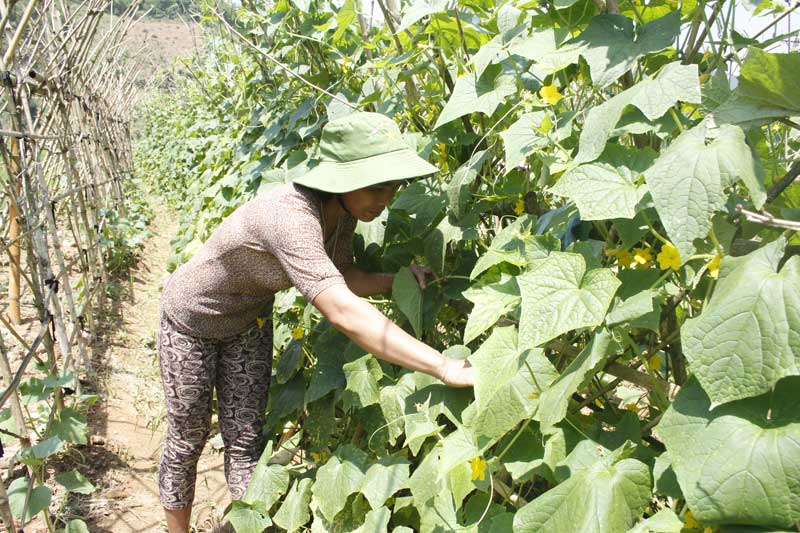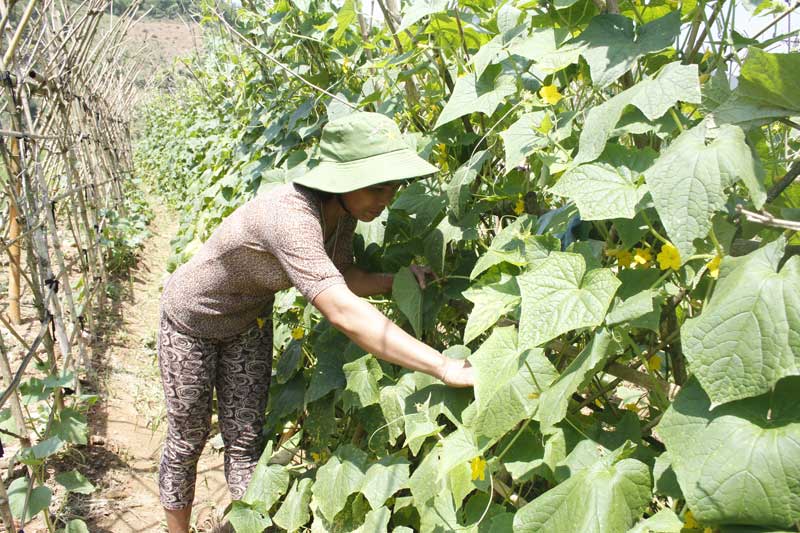
(HBO) – Xa Thi Tuyen in Chum Nua hamlet, Muong Chieng commune in Da Bac district said that her family planted cucumber in an area of 200 square metres and the vegetable sells like hot cakes while cucumber from other localities cannot find customers.
Photo: Xa Thi Tuyen in Chum
Nua hamlet, Muong Chieng commune, uses home-made herbal remedy instead of plant
protection products for her cucumber field to ensure food safety.
"Right from the beginning of the crop, I carefully prepared the soil and grew
the cucumbers organically by using well-rotted manure as fertiliser. Currently,
each kilogramme of my cucumber is sold at 10,000-15,000 VND. I also reduce the
use of plant protection products and especially use no herbicide in my rice and
maize fields”, Tuyen said.
Xa Thi Xu in Na Muoi hamlet, Muong Chieng commune said after she was told about
the harms of the use of too much plant protection chemicals to not only farmers
themselves but also to society and future generations, she has switched to
using garlic, chilli and bitter leaves to make spraying solutions. When she has
free time, she catches the caterpillars and removes weeds by hand instead of
using herbicide.
Xu plants cucumber, maize and rice. Since organic plantation was
applied in her fields, more people have come to purchase her products even at
higher prices, she said.
According to Chairman of Muong Chieng commune People’s Committee Xa Van Hung, the
communal party committee has ordered relevant authorities and mass
organisations to enhance popularisation work to raise public awareness about
the need to reduce the use of plant protection chemicals and stop the use of herbicide
in agricultural production. Many hamlets have made it a local rule not to use
pesticides.
Many households have switched to plants of higher economic value and
traditional cultivation methods using limited plant protection products. Herbicide
has no longer been used in cultivation in the commune. Local people make insect-killing
solutions from garlic, chilli and bitter leaves.
In addition, garbage is collected every Tuesday and Friday into a landfill
site, he added./.
The emulation movement "Hoa Binh joining hands to build new-style rural areas” has been widely spreading, becoming a driving force that motivates the localities to renew rural landscapes and improve the material and spiritual lives of the residents. In this movement, the people play a central role-both as the main implementers and direct beneficiaries of its outcomes.
In response to the global digital revolution, Hoa Binh Newspaper is transforming itself into a modern and multi-platform media hub, blending cutting-edge technology with a restructured newsroom and a new generation of tech-savvy journalists.
Hoa Binh province’s Association of the Elderly recently held a conference to review the project on expanding the inter-generation self-help club model until 2025.
In a move to implement Resolution No. 57-NQ/TW, issued on December 22, 2024 by the Politburo, which targets breakthroughs in science-technology development, innovation, and digital transformation, the Hoa Binh provincial Department of Health has issued a plan to roll out the "Digital Literacy for All” campaign within the local health sector.
An Nghia Commune (Lạc Sơn District) is one of the communes that achieved the tha standard of the national new rural area in 2018. Entering a new development phase, the commune is now trying to meet the criteria for the advanced new rural development. With the strong political will and the public consensus, the commune is gradually overcoming the challenges to reach this goal, aiming for the sustainable development.



